|
Investors put their faith in central banks last week and bought equities as they prepared for the unknown following the Greek vote Sunday. On Sunday, June 17th, Greece will vote for the second time in six weeks after a May 6th ballot failed to result in a government. It should be noted that the Greek constitution permits a third election too. On the week, most equity indexes followed here advanced.
Tensions were high as major global central banks prepared for any turmoil set off by Greece's election results. European Central Bank hinted at an interest rate cut. ECB President Mario Draghi said the ECB was ready to provide money to solvent banks if they needed it, a clear plan to avoid the kind of credit crunch that occurred during the Lehman Brother crisis in 2008. Draghi also said that no Eurozone country faces an inflation risk. The ECB’s primary policy focus is on keeping inflation under a 2 percent ceiling. That gelled with comments from other ECB policymakers that the ECB might be open to cutting interest rates from the current 1.0 percent level.
Britain did not wait for the Greek vote to announce action. Bank of England Governor Mervyn King said late Thursday that the country would launch a scheme to provide cheap long term funding to banks to encourage them to lend to businesses and consumers. The BoE also would activate an emergency liquidity supply. King said the Eurozone’s problems were causing a crisis of confidence in Britain that was leading to a self-reinforcing weaker picture of growth.
|
|
2011 |
2012 |
% Change |
|
Index |
Dec 30 |
June 8 |
June 15 |
Week |
Year |
| Asia/Pacific |
|
|
|
|
|
|
| Australia |
All Ordinaries |
4111 |
4111.2 |
4107.0 |
-0.1% |
-0.1% |
| Japan |
Nikkei 225 |
8455.35 |
8459.3 |
8569.3 |
1.3% |
1.3% |
| Hong Kong |
Hang Seng |
18434.39 |
18502.3 |
19233.9 |
4.0% |
4.3% |
| S. Korea |
Kospi |
1825.74 |
1835.6 |
1858.2 |
1.2% |
1.8% |
| Singapore |
STI |
2646.35 |
2737.9 |
2811.0 |
2.7% |
6.2% |
| China |
Shanghai Composite |
2199.42 |
2281.5 |
2306.9 |
1.1% |
4.9% |
|
|
|
|
|
|
|
| India |
Sensex 30 |
15454.92 |
16718.9 |
16949.8 |
1.4% |
9.7% |
| Indonesia |
Jakarta Composite |
3821.99 |
3825.3 |
3818.1 |
-0.2% |
-0.1% |
| Malaysia |
KLCI |
1530.73 |
1570.6 |
1579.2 |
0.5% |
3.2% |
| Philippines |
PSEi |
4371.96 |
4994.1 |
4930.6 |
-1.3% |
12.8% |
| Taiwan |
Taiex |
7072.08 |
6999.7 |
7155.8 |
2.2% |
1.2% |
| Thailand |
SET |
1025.32 |
1127.1 |
1165.7 |
3.4% |
13.7% |
|
|
|
|
|
|
|
| Europe |
|
|
|
|
|
|
| UK |
FTSE 100 |
5572.28 |
5435.1 |
5478.8 |
0.8% |
-1.7% |
| France |
CAC |
3159.81 |
3051.7 |
3087.6 |
1.2% |
-2.3% |
| Germany |
XETRA DAX |
5898.35 |
6130.8 |
6229.4 |
1.6% |
5.6% |
| Italy |
FTSE MIB |
15089.74 |
13445.5 |
13390.7 |
-0.4% |
-11.3% |
| Spain |
IBEX 35 |
8566.3 |
6552.0 |
6719.0 |
2.5% |
-21.6% |
| Sweden |
OMX Stockholm 30 |
987.85 |
975.8 |
977.5 |
0.2% |
-1.0% |
| Switzerland |
SMI |
5936.23 |
5869.3 |
5911.8 |
0.7% |
-0.4% |
|
|
|
|
|
|
|
| North America |
|
|
|
|
|
|
| United States |
Dow |
12217.56 |
12554.2 |
12767.2 |
1.7% |
4.5% |
|
NASDAQ |
2605.15 |
2858.4 |
2872.8 |
0.5% |
10.3% |
|
S&P 500 |
1257.6 |
1325.7 |
1342.8 |
1.3% |
6.8% |
| Canada |
S&P/TSX Comp. |
11955.09 |
11500.6 |
11524.9 |
0.2% |
-3.6% |
| Mexico |
Bolsa |
37077.52 |
37323.9 |
37738.6 |
1.1% |
1.8% |
 Equities rallied ahead of Sunday’s elections in Greece and France. Investors absorbed weak U.S. economic data without flinching and assumed central banks — think the Federal Reserve — would ride to the rescue. While the second leg of legislative elections in France is expected to allow President François Hollande a majority, the outcome in Greece is anyone’s guess. The FTSE gained 0.8 percent, the CAC was up 1.2 percent, the DAX was 1.6 percent higher while the SMI advanced 0.7 percent. Equities rallied ahead of Sunday’s elections in Greece and France. Investors absorbed weak U.S. economic data without flinching and assumed central banks — think the Federal Reserve — would ride to the rescue. While the second leg of legislative elections in France is expected to allow President François Hollande a majority, the outcome in Greece is anyone’s guess. The FTSE gained 0.8 percent, the CAC was up 1.2 percent, the DAX was 1.6 percent higher while the SMI advanced 0.7 percent.
European markets finished the week on a positive note on speculation that central banks are prepared to inject cash in the event of an escalation in turmoil in the region after the Greek elections. The highly anticipated second round of elections in Greece could determine whether Greece remains a member of the Eurozone — or makes an exit. Financial stocks were strong on Friday, particularly shares of large banks.
On Thursday, central banks began to ramp up their rhetoric — and actions. Late Thursday, the Chancellor of the Exchequer George Osborn and the Chairman of the Bank of England Mervyn King said they would flood its banking system with cash in a coordinated move to get credit flowing through the economy, as the Eurozone crisis casts a "black cloud" over the world economy. The country will launch a scheme to provide cheap long term funding to banks to encourage them to lend to businesses and consumers. At the same time, the BoE will activate an emergency liquidity tool.
The case for pumping more money into the economy via further purchases of government bonds also has increased as the outlook for the economy has worsened, King said, though he again rejected calls for the central bank to buy private assets. King said the Eurozone’s woes are leading to a crisis of confidence in Britain which is leading to a self reinforcing weaker picture of growth. Mr King said the BoE will complement its quantitative easing asset purchase scheme with new steps to encourage bank lending and reduce their funding costs, which have rocketed as a result of the Eurozone crisis. King hinted that the BoE may also restart its asset purchase program, which it halted in May after having bought £325 billion of British government bonds, and countered accusations that the scheme had lost its effectiveness.
In yet another blow to Europe's efforts to contain the deepening debt crisis, Moody's downgraded Spain and Cyprus and placed their bond ratings on review for further possible downgrade. Moody’s cut Spain’s rating by three steps to Baa3 from A3 citing the nation’s increased debt burden, weakening economy and limited access to capital markets. Moody’s also lowered Cyprus’s bond rating to Ba3 from Ba1, attributing the downgrade to the increased likelihood of Greece leaving the euro area. The country’s government may have to give more support to Cypriot banks as a consequence. Late Thursday, Moody’s downgraded a number of Dutch banks because of spillover effects from the crisis.
Swiss National Bank
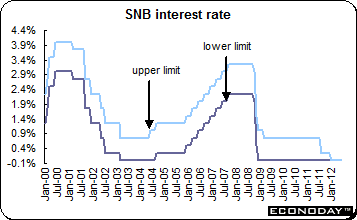 As universally expected, the SNB left its target corridor for 3-month CHF LIBOR unchanged at zero to 0.25 percent and reiterated its aim of keeping the rate as close to zero as possible. More significantly, the Bank’s updated Monetary Policy Assessment also underscored the SNB’s determination to prevent any further appreciation by the Swiss franc. As universally expected, the SNB left its target corridor for 3-month CHF LIBOR unchanged at zero to 0.25 percent and reiterated its aim of keeping the rate as close to zero as possible. More significantly, the Bank’s updated Monetary Policy Assessment also underscored the SNB’s determination to prevent any further appreciation by the Swiss franc.
The CHF1.20 floor against the euro introduced last September will continue to be defended. However, the franc remains under significant upside pressure due to the Eurozone crisis. The SNB, which does not disclose details of its market operations, introduced the ceiling after the franc’s surge to near parity with the euro raised deflation threats and eroded export competitiveness. Foreign currency holdings rose to 303.8 billion francs in May from 237.6 billion francs in April as the turmoil worsened.
Nonetheless, speculation that the monetary authority might introduce capital controls is, for now anyway, just that. The SNB stated that it was ready to take further measures at any time, but clearly wants to keep its powder dry, at least presumably until after the Greek elections which could promote a fresh wave of capital inflows.
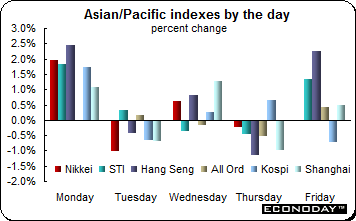 Equities were mostly positive last week despite investor edginess about Sunday’s elections in Greece. Investors were soothed by comments Thursday that the major central banks were prepared to act in case of financial market disruption. However, caution ruled ahead of the weekend. Advances for the week ranged from 0.6 percent for the KLCI to a heady 4.0 percent for the Hang Seng — its best weekly gain since January. The All Ordinaries slipped 0.1 percent while the Jakarta Composite edged 0.2 percent lower and the PSEi dropped 1.3 percent. Trading during the week was volatile with the indexes flipping from positive to negative and back again on a daily basis. Equities were mostly positive last week despite investor edginess about Sunday’s elections in Greece. Investors were soothed by comments Thursday that the major central banks were prepared to act in case of financial market disruption. However, caution ruled ahead of the weekend. Advances for the week ranged from 0.6 percent for the KLCI to a heady 4.0 percent for the Hang Seng — its best weekly gain since January. The All Ordinaries slipped 0.1 percent while the Jakarta Composite edged 0.2 percent lower and the PSEi dropped 1.3 percent. Trading during the week was volatile with the indexes flipping from positive to negative and back again on a daily basis.
Equities were boosted Friday on a Reuters report said that central banks are preparing for coordinated action to provide liquidity if the election leads to chaos in the markets. On Thursday evening, the UK introduced a series of measures designed to shield its financial system from the ongoing European crisis, with plans to flood banks with cheap credit in an attempt to jump start lending to British businesses and households.
China released its May economic data on June 9th and 10th which pointed to a weakening economy, but were not as bad as some expected. China's surprise interest rates cut had been taken by the market as a signal that May's figures were going to be very bad. The most notable figure was inflation, with growth in the consumer price index much lower than expected, at 3.0 percent.
Reserve Bank of New Zealand
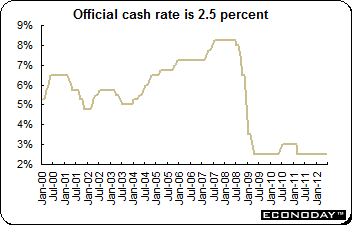 As expected, the Reserve Bank of New Zealand kept its official cash rate (OCR) at 2.5 percent where it has been since March 2011 ahead of Sunday’s Greek election. The RBNZ has an inflation target range of 2 percent to 3 percent. The consumer price index was up 1.6 percent on the year in the March quarter which gives the Bank flexibility without worrying about prices. The RBNZ signaled that it may keep interest rates at a record low for another year as weaker domestic growth eases inflation and Europe’s fiscal crisis clouds the outlook. As expected, the Reserve Bank of New Zealand kept its official cash rate (OCR) at 2.5 percent where it has been since March 2011 ahead of Sunday’s Greek election. The RBNZ has an inflation target range of 2 percent to 3 percent. The consumer price index was up 1.6 percent on the year in the March quarter which gives the Bank flexibility without worrying about prices. The RBNZ signaled that it may keep interest rates at a record low for another year as weaker domestic growth eases inflation and Europe’s fiscal crisis clouds the outlook.
RBNZ governor Alan Bollard has left the cash rate unchanged since March last year to allow the economy to recover after the nation’s deadliest earthquake in 80 years in Christchurch and the surrounding Canterbury province. Unlike counterparts in Australia and China, Bollard has not cut borrowing costs because quake rebuilding is expected to boost growth and stoke inflation in coming years. Still, the recovery has been slow amid concern that Europe’s debt crisis would spill over into weak global demand for exports, which make up 30 percent of New Zealand’s economy.
Bank of Japan
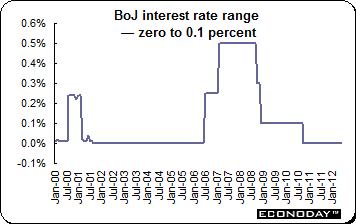 As expected, the Bank of Japan left its monetary policy unchanged ahead of closely watched events such as the Greek election and Group of 20 summit meeting in Mexico. It maintained its key short term interest rate range at zero to 0.1 percent as well as the size of its asset purchase program. The vote was unanimous. The BoJ has not loosened its monetary policy since its meeting on April 27, during which it decided to expand the asset buying program by ¥5 trillion to a total of ¥70 trillion to provide sufficient liquidity to the banking system. However, if the yen rises sharply or stock prices tumble amid turbulence in financial markets, the BoJ may decide on additional easing measures. As expected, the Bank of Japan left its monetary policy unchanged ahead of closely watched events such as the Greek election and Group of 20 summit meeting in Mexico. It maintained its key short term interest rate range at zero to 0.1 percent as well as the size of its asset purchase program. The vote was unanimous. The BoJ has not loosened its monetary policy since its meeting on April 27, during which it decided to expand the asset buying program by ¥5 trillion to a total of ¥70 trillion to provide sufficient liquidity to the banking system. However, if the yen rises sharply or stock prices tumble amid turbulence in financial markets, the BoJ may decide on additional easing measures.
While concerns are growing over the eurozone debt crisis and its impact on the global economy, the Japanese economy has been performing moderately well on the back of reconstruction demand in areas hit by last year's huge earthquake and tsunami in northeastern Japan. In its statement, the BoJ said that the economy has started picking up at a moderate pace. Exports and output also have begun to pick up as well. However, uncertainty over the global economy is high and the Bank has to monitor nervous market moves.
At his post meeting press conference, Bank of Japan Governor Masaaki Shirakawa said that the European debt crisis is the biggest threat to the Japanese economy and said that global central banks share the view that a stable financial system is the most important objective. When asked about the possibility of global central banks taking concerted action to mitigate the impact of any sharp deterioration in the Eurozone crisis, Shirakawa said he was unaware of such a possibility.
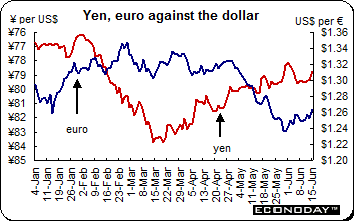 The U.S. dollar was down against its major counterparts last week as investors anticipated that central banks would provide market support as the Greek elections approached. Indeed, the Reserve Bank of New Zealand, Bank of Japan and Swiss National Bank all made a point of stating that they would act should it be needed in the aftermath of the elections. The Bank of England along with the Exchequer also announced plans to protect the UK. And on Friday, the European Central Bank said that it was on standby to keep banks flush with liquidity if Greece creates fresh financial market turmoil. The U.S. dollar was down against its major counterparts last week as investors anticipated that central banks would provide market support as the Greek elections approached. Indeed, the Reserve Bank of New Zealand, Bank of Japan and Swiss National Bank all made a point of stating that they would act should it be needed in the aftermath of the elections. The Bank of England along with the Exchequer also announced plans to protect the UK. And on Friday, the European Central Bank said that it was on standby to keep banks flush with liquidity if Greece creates fresh financial market turmoil.
Selected currencies — weekly results
|
|
2011 |
2012 |
% Change |
|
|
Dec 30 |
June 8 |
June 15 |
Week |
2012 |
| U.S. $ per currency |
|
|
|
|
|
|
| Australia |
A$ |
1.023 |
0.992 |
1.008 |
1.7% |
-1.4% |
| New Zealand |
NZ$ |
0.778 |
0.771 |
0.790 |
2.4% |
1.5% |
| Canada |
C$ |
0.982 |
0.974 |
0.978 |
0.5% |
-0.3% |
| Eurozone |
euro (€) |
1.294 |
1.250 |
1.266 |
1.2% |
-2.2% |
| UK |
pound sterling (£) |
1.554 |
1.547 |
1.570 |
1.5% |
1.1% |
|
|
|
|
|
|
|
| Currency per U.S. $ |
|
|
|
|
|
|
| China |
yuan |
6.295 |
6.375 |
6.368 |
0.1% |
-1.1% |
| Hong Kong |
HK$* |
7.767 |
7.758 |
7.759 |
0.0% |
0.1% |
| India |
rupee |
53.065 |
55.505 |
55.535 |
-0.1% |
-4.4% |
| Japan |
yen |
76.975 |
79.340 |
78.670 |
0.9% |
-2.2% |
| Malaysia |
ringgit |
3.168 |
3.180 |
3.163 |
0.5% |
0.2% |
| Singapore |
Singapore $ |
1.297 |
1.282 |
1.270 |
1.0% |
2.1% |
| South Korea |
won |
1152.450 |
1174.000 |
1165.530 |
0.7% |
-1.1% |
| Taiwan |
Taiwan $ |
30.279 |
29.939 |
29.900 |
0.1% |
1.3% |
| Thailand |
baht |
31.580 |
31.620 |
31.430 |
0.6% |
0.5% |
| Switzerland |
Swiss franc |
0.939 |
0.961 |
0.949 |
1.2% |
-1.0% |
| *Pegged to U.S. dollar |
|
|
|
|
|
|
| Source: Bloomberg |
|
|
|
|
|
|
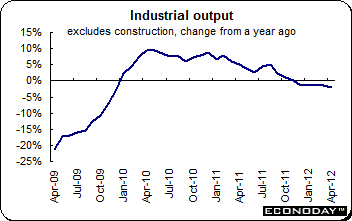 April industrial production dropped 0.8 percent after a revised 0.1 percent decline in March. On the year, output was down 2.3 percent. The headline data benefited from a 6.9 percent rebound in the energy sector that more than reversed March's warm weather inspired 8.1 percent slump. Elsewhere the news was not so positive. In addition to a 2.6 percent drop in capital goods output, intermediates were down 1.2 percent, consumer durables declined 0.9 and consumer nondurables slid 1.6 percent. Regionally for those states supplying figures, the steepest monthly decline was seen in Portugal (6.5 percent) but Germany (down 2.0 percent), Italy (down 1.9 percent) and Spain (down 0.7 percent) all struggled too. April industrial production dropped 0.8 percent after a revised 0.1 percent decline in March. On the year, output was down 2.3 percent. The headline data benefited from a 6.9 percent rebound in the energy sector that more than reversed March's warm weather inspired 8.1 percent slump. Elsewhere the news was not so positive. In addition to a 2.6 percent drop in capital goods output, intermediates were down 1.2 percent, consumer durables declined 0.9 and consumer nondurables slid 1.6 percent. Regionally for those states supplying figures, the steepest monthly decline was seen in Portugal (6.5 percent) but Germany (down 2.0 percent), Italy (down 1.9 percent) and Spain (down 0.7 percent) all struggled too.
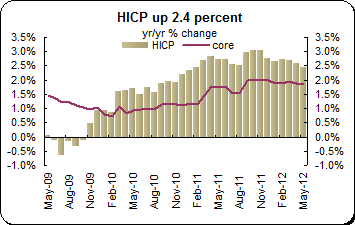 May final harmonized index of consumer prices edged down 0.1 percent on the month and was 2.4 percent higher on the year. Both core measures — excluding food, drink, tobacco & petroleum (1.6 percent) and omitting just seasonal food and petroleum (1.9 percent) — held steady at their respective April rates. However, the HICP less unprocessed food and petroleum saw its 12-month rate edge lower to 1.8 percent. In any event, all three underlying measures remain below 2 percent. Annual inflation in the food sector slowed from 2.7 percent to 2.3 percent and was down 0.8 percentage points to 7.3 percent in energy. Elsewhere changes were relatively small although clothing shed 0.3 percentage points to 1.9 percent while recreation & culture climbed from 0.8 percent to 1.3 percent. Regionally, prices fell in most EMU states. The steepest decline was in Greece which saw its HICP drop 0.3 percent on the month for an annual inflation rate of just 0.9 percent and the lowest of the 17 EMU members. Estonia (4.1 percent) remained at the top of the annual inflation ladder ahead of Cyprus and Malta (both 3.7 percent). Among larger economies, Germany (2.2 percent) was unchanged but France (2.3 percent) and Spain (1.9 percent) were both down a tick and Italy (3.5 percent) was 0.2 percentage points lower. May final harmonized index of consumer prices edged down 0.1 percent on the month and was 2.4 percent higher on the year. Both core measures — excluding food, drink, tobacco & petroleum (1.6 percent) and omitting just seasonal food and petroleum (1.9 percent) — held steady at their respective April rates. However, the HICP less unprocessed food and petroleum saw its 12-month rate edge lower to 1.8 percent. In any event, all three underlying measures remain below 2 percent. Annual inflation in the food sector slowed from 2.7 percent to 2.3 percent and was down 0.8 percentage points to 7.3 percent in energy. Elsewhere changes were relatively small although clothing shed 0.3 percentage points to 1.9 percent while recreation & culture climbed from 0.8 percent to 1.3 percent. Regionally, prices fell in most EMU states. The steepest decline was in Greece which saw its HICP drop 0.3 percent on the month for an annual inflation rate of just 0.9 percent and the lowest of the 17 EMU members. Estonia (4.1 percent) remained at the top of the annual inflation ladder ahead of Cyprus and Malta (both 3.7 percent). Among larger economies, Germany (2.2 percent) was unchanged but France (2.3 percent) and Spain (1.9 percent) were both down a tick and Italy (3.5 percent) was 0.2 percentage points lower.
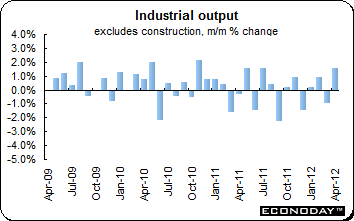 April industrial production posted a 1.5 percent monthly increase that more than reversed a slightly steeper revised 1.0 percent drop in March. Annual growth rebounded to 0.9 percent from a 1.0 percent decline. However, once again a sharp swing in energy output dominated the headline data and in this case masked a noticeably weaker underlying picture. Manufacturing contracted 0.7 percent, reflecting declines in transport equipment (2.2 percent), food & drink (0.6 percent), electrical & electronic equipment (0.2 percent) as well as in the other manufactured goods category (0.6 percent). The only sub-sector to register an increase in output was coke & refined petroleum products (0.3 percent). The overall expansion was attributable to a 16.6 percent leap in electricity & gas production, itself attributable to the effects of the month's unusually poor weather. This followed a 15.0 percent slump at the end of the second quarter when temperatures were unseasonably high. April industrial production posted a 1.5 percent monthly increase that more than reversed a slightly steeper revised 1.0 percent drop in March. Annual growth rebounded to 0.9 percent from a 1.0 percent decline. However, once again a sharp swing in energy output dominated the headline data and in this case masked a noticeably weaker underlying picture. Manufacturing contracted 0.7 percent, reflecting declines in transport equipment (2.2 percent), food & drink (0.6 percent), electrical & electronic equipment (0.2 percent) as well as in the other manufactured goods category (0.6 percent). The only sub-sector to register an increase in output was coke & refined petroleum products (0.3 percent). The overall expansion was attributable to a 16.6 percent leap in electricity & gas production, itself attributable to the effects of the month's unusually poor weather. This followed a 15.0 percent slump at the end of the second quarter when temperatures were unseasonably high.
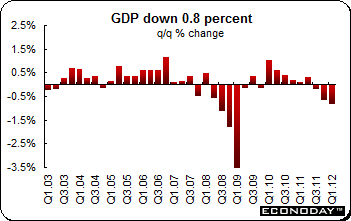 First quarter gross domestic product contracted an unrevised 0.8 percent on the quarter at the start of the year. On the year, GDP contracted 1.4 percent. The first look at the GDP expenditure components confirmed the acute weakness of domestic demand. Private consumption declined 1.0 percent on the quarter and fixed investment was down 3.6 percent. Within the latter, construction dropped 3.3 percent while transportation plunged 12.5 percent. Net trade provided a useful boost but only because imports (down 3.6 percent) fell more quickly than exports (down 0.6 percent). The only positive element within final sales was government current spending which was 0.4 percent higher. First quarter gross domestic product contracted an unrevised 0.8 percent on the quarter at the start of the year. On the year, GDP contracted 1.4 percent. The first look at the GDP expenditure components confirmed the acute weakness of domestic demand. Private consumption declined 1.0 percent on the quarter and fixed investment was down 3.6 percent. Within the latter, construction dropped 3.3 percent while transportation plunged 12.5 percent. Net trade provided a useful boost but only because imports (down 3.6 percent) fell more quickly than exports (down 0.6 percent). The only positive element within final sales was government current spending which was 0.4 percent higher.
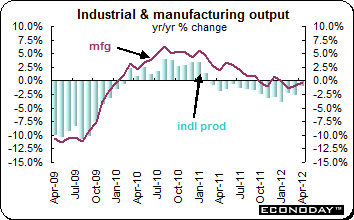 April industrial production was unchanged on the month and 1.0 percent lower on the year. However, the key manufacturing area dropped 0.7 percent on the month and was down 0.3 percent on the year. In line with much of the rest of Europe, the UK headline data were again distorted by another sharp swing in energy output. After having posted a 6.4 percent monthly drop in March on the back of unseasonably warm weather, this time around electricity, gas, steam & air conditioning output surged 13.6 percent as April witnessed the heaviest rains on record. This alone added more than 1.2 percentage points to the monthly change in overall industrial production. Complicating matters further, oil & gas extraction contracted 6.4 percent from March, due in no small way to oil rig maintenance in the North Sea's Elgin field. Within the monthly decline in manufacturing, seven sub-sectors were down while six were higher. Pharmaceuticals (down 6.0 percent) and other manufacturing & repair (down 5.1 percent) were the worst performers. The gainers were led by computer, electronic & optical products (8.1 percent). April industrial production was unchanged on the month and 1.0 percent lower on the year. However, the key manufacturing area dropped 0.7 percent on the month and was down 0.3 percent on the year. In line with much of the rest of Europe, the UK headline data were again distorted by another sharp swing in energy output. After having posted a 6.4 percent monthly drop in March on the back of unseasonably warm weather, this time around electricity, gas, steam & air conditioning output surged 13.6 percent as April witnessed the heaviest rains on record. This alone added more than 1.2 percentage points to the monthly change in overall industrial production. Complicating matters further, oil & gas extraction contracted 6.4 percent from March, due in no small way to oil rig maintenance in the North Sea's Elgin field. Within the monthly decline in manufacturing, seven sub-sectors were down while six were higher. Pharmaceuticals (down 6.0 percent) and other manufacturing & repair (down 5.1 percent) were the worst performers. The gainers were led by computer, electronic & optical products (8.1 percent).
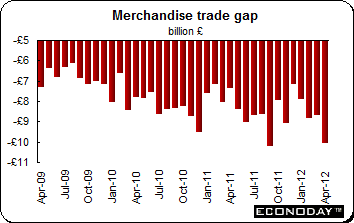 April merchandise trade deficit widened to Stg10.1 billion, up more than Stg1 billion from the end of the first quarter, the second largest on record and the first double digit reading since September 2011. Particularly worrying were exports which, following a solid increase in March, slumped 8.6 percent on the month. Imports were down 2.5 percent. Moreover, the deterioration in the headline data was largely mirrored in the underlying red ink which increased from Stg7.3 billion last time to Stg8.3 billion. Exports to the non-EU area collapsed 10.3 percent on the month. With imports down 1.9 percent, the bilateral trade shortfall jumped from Stg4.2 billion to Stg5.2 billion. At the same time exports to the rest of the EU dropped nearly 7 percent and were the cause of a Stg0.4 billion increase in the deficit with this region to Stg4.9 billion. April merchandise trade deficit widened to Stg10.1 billion, up more than Stg1 billion from the end of the first quarter, the second largest on record and the first double digit reading since September 2011. Particularly worrying were exports which, following a solid increase in March, slumped 8.6 percent on the month. Imports were down 2.5 percent. Moreover, the deterioration in the headline data was largely mirrored in the underlying red ink which increased from Stg7.3 billion last time to Stg8.3 billion. Exports to the non-EU area collapsed 10.3 percent on the month. With imports down 1.9 percent, the bilateral trade shortfall jumped from Stg4.2 billion to Stg5.2 billion. At the same time exports to the rest of the EU dropped nearly 7 percent and were the cause of a Stg0.4 billion increase in the deficit with this region to Stg4.9 billion.
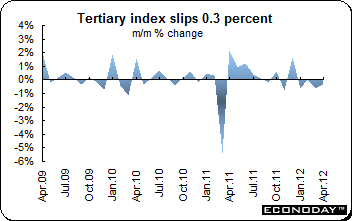 April tertiary index surprised and declined 0.3 percent but was up 2.4 percent on the year. Analysts expected the index to increase 0.4 percent on the month. Transport & postal activities declined 2.0 percent, miscellaneous services (except government services etc.) dropped 2.2 percent, electricity, gas, heat supply & water was 1.3 percent lower, accommodations, eating & drinking services retreated 0.5 percent, scientific research, professional & technical services slid 0.4 percent and living related & personal services & amusement services was 0.2 percent lower. However, information & communications jumped 6.5 percent, wholesale & retail trade was 0.8 percent higher, finance & insurance was up 0.7 percent, real estate & goods rental & leasing edged up 0.2 percent, learning support gained 0.6 percent and compound services advanced 3.8 percent. April tertiary index surprised and declined 0.3 percent but was up 2.4 percent on the year. Analysts expected the index to increase 0.4 percent on the month. Transport & postal activities declined 2.0 percent, miscellaneous services (except government services etc.) dropped 2.2 percent, electricity, gas, heat supply & water was 1.3 percent lower, accommodations, eating & drinking services retreated 0.5 percent, scientific research, professional & technical services slid 0.4 percent and living related & personal services & amusement services was 0.2 percent lower. However, information & communications jumped 6.5 percent, wholesale & retail trade was 0.8 percent higher, finance & insurance was up 0.7 percent, real estate & goods rental & leasing edged up 0.2 percent, learning support gained 0.6 percent and compound services advanced 3.8 percent.
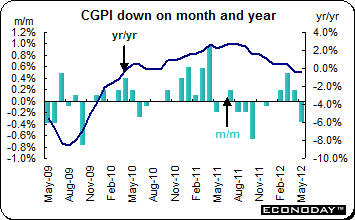 May corporate goods price index declined 0.4 percent and was down 0.5 percent on the year. Petroleum & coal product prices, reflecting worldwide price declines, dropped 3.9 percent on the month after increasing 3.2 percent in April. Nonferrous metals decline picked up pace and were down 2.7 percent after sliding 1.0 percent the month before. Prices for other categories were mixed with little change positive or negative. Price declines were numerous when compared with a year ago. Nonferrous metals dropped 8.2 percent, information & communications equipment dropped 5.8 percent and iron & steel prices sank 6.0 percent on the year, reflecting slower demand amid the global growth slowdown. May corporate goods price index declined 0.4 percent and was down 0.5 percent on the year. Petroleum & coal product prices, reflecting worldwide price declines, dropped 3.9 percent on the month after increasing 3.2 percent in April. Nonferrous metals decline picked up pace and were down 2.7 percent after sliding 1.0 percent the month before. Prices for other categories were mixed with little change positive or negative. Price declines were numerous when compared with a year ago. Nonferrous metals dropped 8.2 percent, information & communications equipment dropped 5.8 percent and iron & steel prices sank 6.0 percent on the year, reflecting slower demand amid the global growth slowdown.
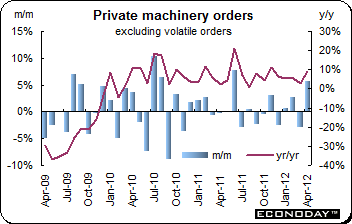 April private machinery orders excluding volatile items such as ships and those from electric power companies jumped 5.7 percent after dropping 2.8 percent in March. On the year, these orders were up 9.1 percent. Manufacturing orders were up 3.4 percent while nonmanufacturing orders jumped 5.7 percent. Orders from overseas edged up 0.3 percent after sinking 14.4 percent last month. The total value of machinery orders received by 280 manufacturers operating in Japan declined 4.0 percent in April from the previous month. For the April to June period, the total amount of machinery orders was forecast to decrease by 9.4 percent while private sector orders, excluding volatile items, were expected to be 2.6 percent higher from the previous quarter respectively. April private machinery orders excluding volatile items such as ships and those from electric power companies jumped 5.7 percent after dropping 2.8 percent in March. On the year, these orders were up 9.1 percent. Manufacturing orders were up 3.4 percent while nonmanufacturing orders jumped 5.7 percent. Orders from overseas edged up 0.3 percent after sinking 14.4 percent last month. The total value of machinery orders received by 280 manufacturers operating in Japan declined 4.0 percent in April from the previous month. For the April to June period, the total amount of machinery orders was forecast to decrease by 9.4 percent while private sector orders, excluding volatile items, were expected to be 2.6 percent higher from the previous quarter respectively.
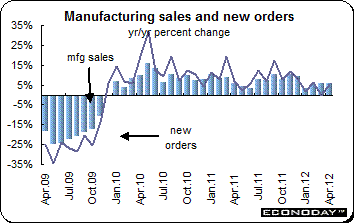 April manufacturing sales dropped 0.8 percent for the third decline in four months. On the year, sales were up 5.8 percent. Sales dropped in 13 of 21 industries, representing approximately 45 percent of the manufacturing sector. Sales of durable goods decreased 0.7 percent while nondurable goods sales declined 1.0 percent. Volumes declined 0.6 percent reflecting a reduced volume of manufactured goods sold. This was also the third drop in four months. Production in the aerospace product & parts industry dropped 33.7 percent following strong gains in February and March. Sales of petroleum & coal products were down 4.9 percent for the first decline after three months of increases. The decline was volume based as there were temporary shutdowns at some refineries and prices of petroleum and coal products were up 0.5 percent. However, motor vehicle assembly sales increased 9.0 percent for the ninth increase in 10 months for the industry. Sales were at their highest level since November 2007. Unfilled orders remained at C$62.6 billion in April, following a 2.1 percent advance in March. New orders dropped 3.2 percent, mostly reflecting a drop in the aerospace product and parts industry. April manufacturing sales dropped 0.8 percent for the third decline in four months. On the year, sales were up 5.8 percent. Sales dropped in 13 of 21 industries, representing approximately 45 percent of the manufacturing sector. Sales of durable goods decreased 0.7 percent while nondurable goods sales declined 1.0 percent. Volumes declined 0.6 percent reflecting a reduced volume of manufactured goods sold. This was also the third drop in four months. Production in the aerospace product & parts industry dropped 33.7 percent following strong gains in February and March. Sales of petroleum & coal products were down 4.9 percent for the first decline after three months of increases. The decline was volume based as there were temporary shutdowns at some refineries and prices of petroleum and coal products were up 0.5 percent. However, motor vehicle assembly sales increased 9.0 percent for the ninth increase in 10 months for the industry. Sales were at their highest level since November 2007. Unfilled orders remained at C$62.6 billion in April, following a 2.1 percent advance in March. New orders dropped 3.2 percent, mostly reflecting a drop in the aerospace product and parts industry.
The Bank of Japan, Reserve Bank of New Zealand and the Swiss National Bank left their respective monetary policies unchanged. However, all referred to the situation in Europe in their post meeting statement and reiterated their preparedness to act should it be necessary. US economic data disappointed for the most part. However, investors looked upon it as more reasons that the Federal Reserve will add stimulus to boost flagging growth when it meets on June 19th and 20th.
In Athens, the election was seen as too close to call. Alexis Tsipras, leader of the main anti-bailout leftist party SYRIZA, said on Thursday the deal with Greece's international lenders, which has helped push the economy into a depression, would not last beyond the weekend. SYRIZA is running neck-and-neck with the mainstream conservatives for Sunday's parliamentary vote, a re-run of an election last month that produced a stalemate in which neither the pro nor anti bailout camps was able to form a coalition. European leaders, however, have warned that Greece will get no help if it reneges. Officials have also hinted that Athens might be granted more time to achieve its fiscal targets if a new government sticks to the core reforms in the program.
| Central Bank activities |
|
| June 19, 20 |
United States |
FOMC Meeting and Chairman's Press Conference |
|
|
|
| Other activities |
|
|
| June 18, 19 |
Mexico |
Group of 20 Meeting |
|
|
|
| The following indicators will be released this week... |
| Europe |
|
|
| June 19 |
Germany |
ZEW Survey (June) |
|
UK |
Consumer Price Index (May) |
| June 20 |
Germany |
Producer Price Index (May) |
|
UK |
Labour Market Report (May) |
| June 21 |
Eurozone |
PMI Manufacturing Index (June, flash) |
|
|
PMI Services Index (June, flash) |
|
Germany |
PMI Manufacturing Index (June, flash) |
|
|
PMI Services Index (June, flash) |
|
UK |
Retail Sales (May) |
| June 22 |
Germany |
Ifo Business Survey (June) |
|
|
|
| Asia/Pacific |
|
|
| June 20 |
Japan |
Merchandise Trade Balance (May) |
|
China |
PMI Manufacturing Index (June, flash) |
|
|
|
| Americas |
|
|
| June 21 |
Canada |
Retail Sales (April) |
| June 22 |
Canada |
Consumer Price Index (May) |
Anne D Picker is the author of International Economic Indicators and Central Banks.
|

